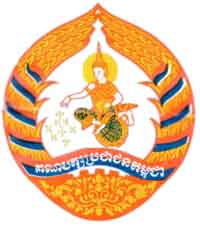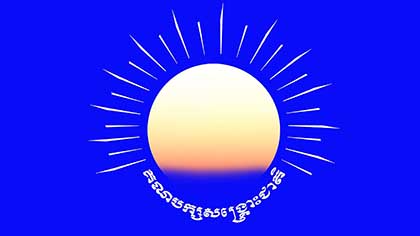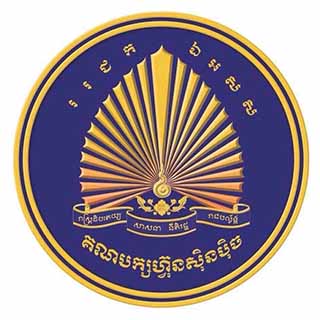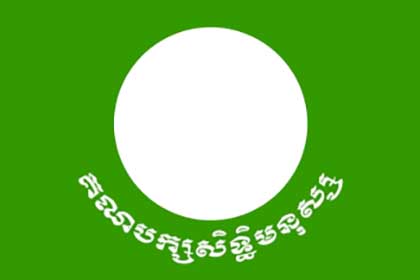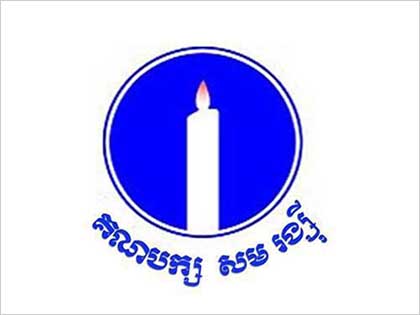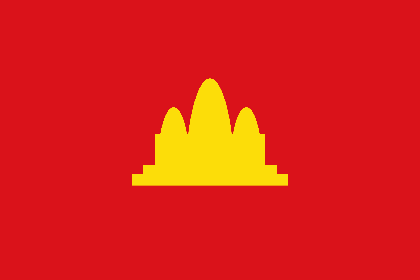
Cambodian People’s Party banner stands next to an entrance to one of the Buddhist temples in Peam Kaoh Sna commune, Prime Minister Hun Sen’s hometown, in Kampong Cham province. (Aun Chhengpor | VOA Khmer)
Community Stories
In Prime Minister’s Birthplace, Patronage and Myth Seal Support
Hun Sen’s interactions with his native Peam Kaoh Sna commune have brought solid support to his ruling Cambodian People’s Party.
Peam Koh Sna Commune, Kampong Cham Province As Prime Minister Hun Sen prepares to extend his 33-year rule over Cambodia in the July 29 elections, his government has cracked down on political rivals and opposition voices, while his party has launched a grassroots drive to tie as many people as possible to the party.
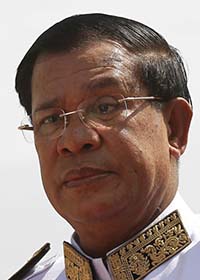 Hun Sen
Prime MinisterIn the strongman’s native village of Peam Krav, a picturesque settlement of wooden houses on stilts on the red-soil banks of the Mekong River, his Cambodian People’s Party (CPP) will not have a hard time getting votes.
Hun Sen
Prime MinisterIn the strongman’s native village of Peam Krav, a picturesque settlement of wooden houses on stilts on the red-soil banks of the Mekong River, his Cambodian People’s Party (CPP) will not have a hard time getting votes.
Here, deep in the heartland of northeastern Cambodia and in Kampong Cham Province—previously governed by his brother Hun Neng—the prime minister enjoys strong popularity and a mythical reputation as a survivor destined by fate to rule.
| By the numbers | National |
|---|
The premier’s interactions with his native Peam Kaoh Sna commune have brought solid support. The CPP has won all elections for years, though, like elsewhere, the now-banned opposition Cambodia National Rescue Party (CNRP) increased its votes in the 2017 commune elections, taking three out of nine seats.
One villager feeling personally grateful for Hun Sen’s apparent benevolence is Met Hat, 34. “Since I was born, he has been here. I studied at his school, I commute on his road, and my mother received land from him,” she said. “If I vote for another (leader), I am afraid the country will not be peaceful.”
Another supporter is Doung Yun, 37, who lives near a Mekong River bridge construction project that Hun Sen has promoted.
“I am happy that Samdech [Hun Sen] is building the bridge here,” said Doung Yun. “I will vote for Samdech since he is the leader who … developed the country.”
Perhaps wary of the land grabs that often affect farmers who live near development projects in Hun Sen’s Cambodia, Doung Yun added: “I hope the government will compensate me if they take land for the bridge, so that I can buy land elsewhere and build a new house for my family.”
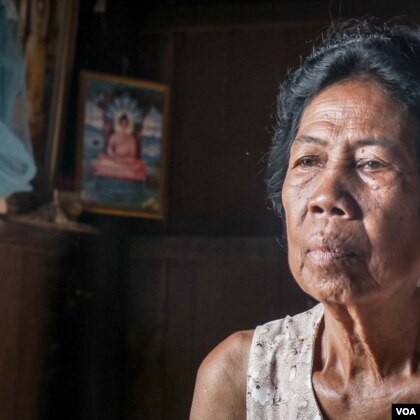
“I thought he had died. His fate is good. That is why he holds the position [of prime minister],” says Chorn Nath, 78.
‘The right fortune to become king’
Chorn Nath, 78, remembers Hun Sen as a neighborhood boy when his name was still Hun Bunal. “We all played together during the Water Festival boat race,” she said, referring to an annual holiday.
She recalled how Hun Sen disappeared in his late teens from the village to join the Khmer Rouge forces in the jungle in the early 1970s, reportedly because then-Prince Sihanouk called on youths to resist the coup d’état against him by U.S.-backed Gen. Lon Nol.
Fleeing bloody internal purges among the Khmer Rouge units in the northeast region in 1977, he and a small group of defectors crossed into Vietnam. They were welcomed and Hun Sen was trained to become the 28-year-old foreign minister in the communist government that Vietnam installed in Phnom Penh after ousting Pol Pot’s murderous Khmer Rouge regime in January 1979.

Hun Sen enlisted with the Khmer Rouge in the 1970s. (Facebook)
In 1985, he became prime minister with Hanoi’s backing; he has since eliminated all his rivals through a mix of skilled leadership and brute force.
Chorn Nath said Hun Sen’s re-emergence after the violent turmoil of the 1970s had surprised those left in the village. “I thought he had died. His fate is good. That is why he holds the position [of prime minister],” she said.
Another former neighbor, Ek Teng, 69, also held this view, which is common in this superstitious country. “He has the right fortune to become king,” she said.
Hun Sen has fostered the traditional idea of being mandated by the heavens to rule as a Cambodian king of old. He has compared himself with the 16th-century Sdech (King) Kan, who was born a common man in northeast Cambodia. Recently, authorities have begun extolling the legend of Sdech Kan by building statues across the country that resemble the prime minister.
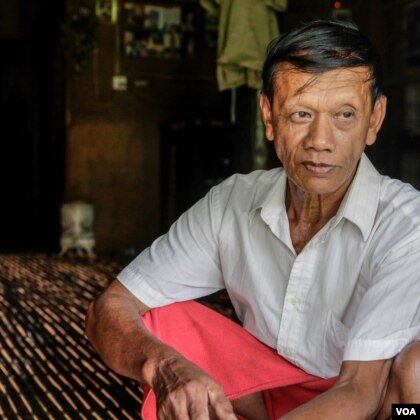
“I was a soldier like him, but he has good fortune. I also helped liberate the country, but I have no government position,” says Dy Bit, Hun Sen’s cousin.
To live by Hun Sen’s grace
Dy Bit, a cousin of Hun Sen and a farmer and petty trader, said his early life had mirrored that of his famous cousin. He joined the Khmer Rouge and later defected to join the Vietnamese-backed People’s Republic of Kampuchea government army to fight Pol Pot.
“I was a soldier like him, but he has good fortune. I also helped liberate the country, but I have no government position,” he said, sitting below his simple wooden house.
Dy Bit, 66, said Hun Sen is a “patriot” and is “strong, good at theory, has good knowledge and is a skilled speaker.” He said he only used his family ties once to ask for support in a letter to Hun Sen when some 200 village families lost land due to a riverbank collapse in 2012.
Hun Sen arranged for them to receive 2 hectares of farmland and housing plot each in neighboring Kampong Thom province. The premier also ordered the construction of Buddhist pagodas and a new road to connect the area to the district capital Steung Trang, so villagers could more easily trade their soybean, sesame and tobacco crops.
Chhorn Nath, Hun Sen’s childhood neighbor, was among those who received land. “The river bank has eroded so he gave us land,” she said, adding that she stayed in Peam Krav and sold the land for some $3,000 as she could not work it.
The actions by Hun Sen are in keeping with his political style of personally intervening as a generous benefactor to selected calamity-hit communities, which is a powerful sign of patronage that fits with Cambodia’s political culture.
He has shied away, however, from reforms that address root causes of community grievances, such as rampant government corruption, widespread land grabbing and illegal logging by powerful companies across the country.

This bridge across the Mekong River in Steung Trang district is being funded by a $57 million loan from China. (Aun Chhengpor | VOA Khmer)
Real or divine?
While politicking in rural communities, Hun Sen commonly blurs the lines between his real and divine powers, and between public investment and his personal benevolence.
Throughout the country, countless roads, schools and bridges have been named after Hun Sen or his wife, despite often being funded by foreign donors. At the projects’ launch or inauguration, his speeches reinforce these perceptions or, alternatively, raise the specter of a return to civil war and destruction if he leaves power.
In February, at a groundbreaking ceremony for a bridge across the Mekong River in Steung Trang district, Hun Sen told local villagers he would personally ensure its completion. “I will come to inaugurate the bridge in 2021… because I will be the prime minister for at least 10 more years,” he said.
The project is funded by a $57 million loan from China, which has become the CPP government’s main international backer in recent years.
Turning to the divine support for his rule, Hun Sen told the community: “Human fate cannot be seen. I had no wish [to be a leader], I just wanted to become an ordinary teacher, but human fate is unpredictable.”




